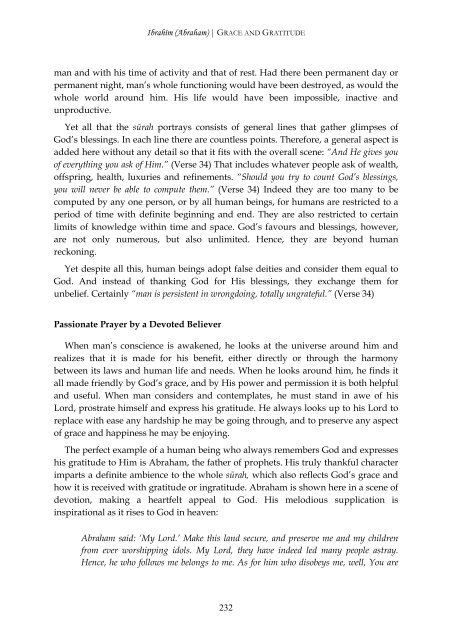Volume 10 Surah 12 - 15 - Enjoy Islam
Volume 10 Surah 12 - 15 - Enjoy Islam
Volume 10 Surah 12 - 15 - Enjoy Islam
Create successful ePaper yourself
Turn your PDF publications into a flip-book with our unique Google optimized e-Paper software.
Ibrahīm (Abraham) | GRACE AND GRATITUDE<br />
man and with his time of activity and that of rest. Had there been permanent day or<br />
permanent night, man’s whole functioning would have been destroyed, as would the<br />
whole world around him. His life would have been impossible, inactive and<br />
unproductive.<br />
Yet all that the sūrah portrays consists of general lines that gather glimpses of<br />
God’s blessings. In each line there are countless points. Therefore, a general aspect is<br />
added here without any detail so that it fits with the overall scene: “And He gives you<br />
of everything you ask of Him.” (Verse 34) That includes whatever people ask of wealth,<br />
offspring, health, luxuries and refinements. “Should you try to count God’s blessings,<br />
you will never be able to compute them.” (Verse 34) Indeed they are too many to be<br />
computed by any one person, or by all human beings, for humans are restricted to a<br />
period of time with definite beginning and end. They are also restricted to certain<br />
limits of knowledge within time and space. God’s favours and blessings, however,<br />
are not only numerous, but also unlimited. Hence, they are beyond human<br />
reckoning.<br />
Yet despite all this, human beings adopt false deities and consider them equal to<br />
God. And instead of thanking God for His blessings, they exchange them for<br />
unbelief. Certainly “man is persistent in wrongdoing, totally ungrateful.” (Verse 34)<br />
Passionate Prayer by a Devoted Believer<br />
When man’s conscience is awakened, he looks at the universe around him and<br />
realizes that it is made for his benefit, either directly or through the harmony<br />
between its laws and human life and needs. When he looks around him, he finds it<br />
all made friendly by God’s grace, and by His power and permission it is both helpful<br />
and useful. When man considers and contemplates, he must stand in awe of his<br />
Lord, prostrate himself and express his gratitude. He always looks up to his Lord to<br />
replace with ease any hardship he may be going through, and to preserve any aspect<br />
of grace and happiness he may be enjoying.<br />
The perfect example of a human being who always remembers God and expresses<br />
his gratitude to Him is Abraham, the father of prophets. His truly thankful character<br />
imparts a definite ambience to the whole sūrah, which also reflects God’s grace and<br />
how it is received with gratitude or ingratitude. Abraham is shown here in a scene of<br />
devotion, making a heartfelt appeal to God. His melodious supplication is<br />
inspirational as it rises to God in heaven:<br />
Abraham said: ‘My Lord.’ Make this land secure, and preserve me and my children<br />
from ever worshipping idols. My Lord, they have indeed led many people astray.<br />
Hence, he who follows me belongs to me. As for him who disobeys me, well, You are<br />
232

















